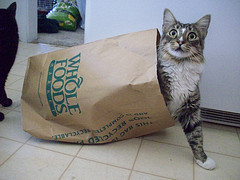Whole Foods Says It Won't Sell Any Unsustainable Seafood

(AlishaV)
Whole Foods, that bastion of all things labeled “organic,” has taken another step deeper into the environmentally-friendly pool by announcing they will stop selling fish or other seafood caught in depleted waters or through ecologically damaging methods.
The sustainable change will happen starting on Earth Day, April 22, reports the Associated Press (via NPR). Any wild-caught seafood that is “red-rated,” which means it’s from an overfished area or somehow harms the species, will not cross Whole Foods’ doors. Advocacy group Blue Ocean Institute and the Monterey Bay Aquarium determine the ratings.
That will mean no more octopus, gray sole, skate, Atlantic halibut and Atlantic cod caught by trawls, which can destroy habitats. Instead, Whole Foods will bring in replacements that are caught by sustainable methods like cod from lines and halibut from the Pacific.
“In the long term, what we’re really looking to do is help reverse trends of overfishing and bi-catch, so that really we can move the industry as a whole toward greater sustainability,” said seafood quality standards coordinator Carrie Brownstein. And another feather in the store’s cap — they’re making this change a year before they’re own internal deadline.
Sure, some prices could be higher for sustainable products, but if you’re in Whole Foods paying for all-natural organic wild purple bean meal, you’re already expecting to pay a bit more, right?
Whole Foods isn’t the first grocery store in the sustainability club: BJ’s Wholesale Club announced a policy for its seafood to be sustainable by 2014. Meanwhile, Supervalu, which operates Albertsons, Shop ‘n Save and seven other retail brands, is going to ensure it’s farm-raised seafood meats sustainable standards and stop selling six wild-caught species.
Whole Foods To Stop Sale Of Unsustainable Seafood [NPR]
Want more consumer news? Visit our parent organization, Consumer Reports, for the latest on scams, recalls, and other consumer issues.

